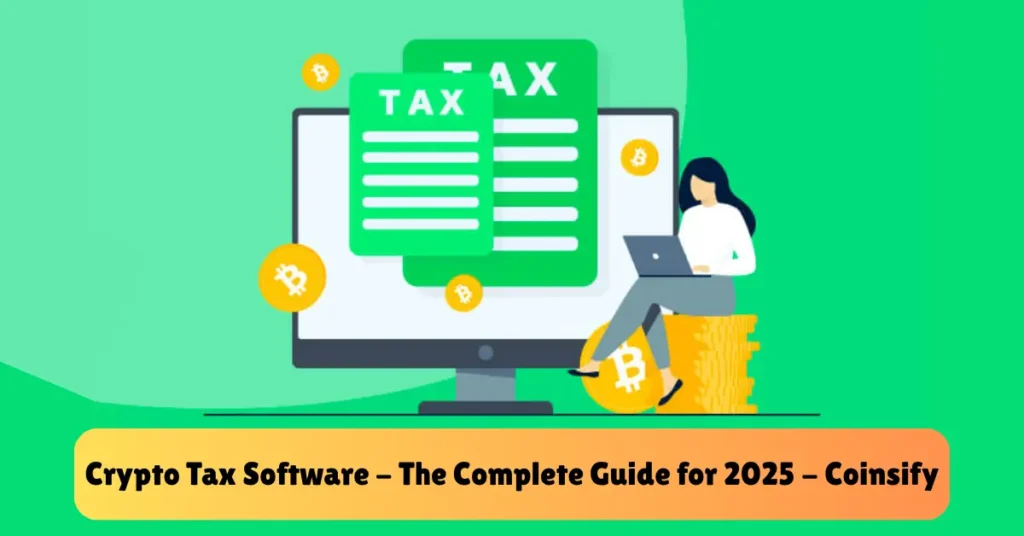Introduction
Cryptocurrency might be the future of finance, but one thing about it is stuck in the present—taxes. If you’ve traded, mined, staked, or even received crypto in any form, you owe Uncle Sam (or your local taxman) a cut. But how do you make sense of thousands of tiny transactions across dozens of exchanges and wallets? That’s where crypto tax software steps in.
In 2025, with crypto adoption skyrocketing, tax authorities worldwide are tightening their grip. Whether you’re a casual trader or a full-time crypto entrepreneur, staying compliant is non-negotiable. Crypto tax software isn’t just a convenience anymore—it’s a necessity.
This guide will walk you through everything you need to know about crypto tax software: how it works, which tools are best, and how to make your crypto taxes less painful. Ready to make tax season a breeze? Let’s dive in.
Understanding Crypto Taxation
Before you can appreciate the beauty of crypto tax software, you need to understand the mess it’s solving. Crypto taxation isn’t like traditional finance. Every trade, swap, or even gift can be a taxable event.
How is crypto taxed?
Governments generally treat crypto as property, not currency. That means every time you sell, trade, or use crypto, it’s potentially a taxable event. Whether you’re cashing out Bitcoin, swapping Ethereum for Solana, or even buying a coffee with Litecoin—it might all need to be reported.
Taxable events in crypto
Here’s a quick breakdown:
- Selling crypto for fiat (BTC to USD): Taxable
- Trading one crypto for another (ETH for ADA): Taxable
- Using crypto to pay for goods/services: Taxable
- Earning crypto through mining or staking: Income tax
- Receiving airdrops or rewards: Income tax
Capital Gains vs. Income
Not all crypto earnings are created equal. Selling your tokens counts as a capital gain or loss. Meanwhile, mining, staking, and airdrops are typically taxed as income—at your regular tax rate. This split makes tracking transactions and categorizing them correctly a nightmare—unless you have the right tool.
Challenges in Calculating Crypto Taxes Manually
So why not do it all by hand? Well, here’s the catch: manually calculating your crypto taxes is like trying to count grains of sand. It’s exhausting, error-prone, and can cost you dearly if you make a mistake.
Complexity of tracking every transaction
Each transaction has its own timestamp, value at the time, and potentially different tax treatments. Add in hundreds of trades across different platforms? That’s a spreadsheet nightmare.
Multiple wallets and exchanges
Most crypto users aren’t loyal to one platform. You might have Coinbase, Binance, MetaMask, Ledger, and a couple of DeFi wallets. Tracking all of these individually and aggregating data is nearly impossible without automation.
Risk of errors
Miss a transaction? Misclassify a staking reward? Use the wrong cost basis method (like FIFO or LIFO)? Any of these can lead to incorrect filings, penalties, or even audits. Crypto tax software eliminates these risks by pulling in your data and applying tax rules consistently.
What is Crypto Tax Software?
Crypto tax software is a digital tool designed to automate, simplify, and ensure the accuracy of your crypto tax reporting. Think of it as a virtual accountant that understands blockchain better than most CPAs.
Core Functions:
- Import transactions from multiple exchanges and wallets
- Categorize every transaction (buy, sell, trade, airdrop, etc.)
- Calculate capital gains/losses
- Generate tax reports (Form 8949, Schedule D, international equivalents)
Why It Works:
It uses APIs or CSV uploads to sync your data across platforms. Instead of manually copying prices or calculating gains, the software does it all—based on real-time prices and historical cost data.
Benefits Over Traditional Methods:
- Saves hours (or even days) of manual work
- Reduces error margins significantly
- Helps you stay compliant with local regulations
- Provides audit-proof documentation
Bottom line? It gives you peace of mind, accuracy, and time to focus on what you love—exploring the crypto space.
Key Features to Look for in a Crypto Tax Tool
Not all crypto tax tools are created equal. Some are basic, others are beasts packed with features. Here’s what to look for when choosing the best software for your needs:
Integration with Wallets & Exchanges
The more platforms your tool supports, the better. Look for integrations with:
- Major exchanges (Coinbase, Binance, Kraken)
- Wallets (MetaMask, Ledger, Trust Wallet)
- DeFi protocols and NFT platforms
Real-Time Portfolio Tracking
Some tools let you monitor your gains/losses throughout the year. This helps you make smart tax-saving moves before year-end.
Tax Report Generation
The tool should support your country’s tax forms. For the US, that means:
- Form 8949: for capital gains/losses
- Schedule D: summary of transactions
- Income Reports: for mining/staking rewards
Support for NFTs, Staking & DeFi
Modern tax tools must handle complex crypto activities:
- NFT minting and sales
- Yield farming rewards
- Liquidity pool transactions
- Governance token airdrops
Accuracy and Audit Protection
The best tools provide downloadable tax reports, detailed transaction logs, and CPA review features. Some even offer audit defense services in case the IRS comes knocking.
Top Crypto Tax Software in 2025
With the explosion in crypto usage, a flood of tax software tools has entered the market. But not all of them offer the same quality, integrations, or user-friendliness. Here’s a breakdown of the top crypto tax software in 2025—based on features, performance, and ease of use.
CoinTracker
CoinTracker is one of the most popular names in the space, trusted by over a million users. It’s known for its clean UI and seamless integration with top exchanges and wallets.
Key Features:
- Automatic syncing with over 500 exchanges and wallets
- DeFi and NFT transaction support
- Real-time portfolio performance tracking
- TurboTax and TaxAct integration
Pros:
- Easy to use for beginners
- Mobile app available
- Offers IRS-ready tax reports
Cons:
- Premium pricing for large numbers of transactions
- Limited customization in tax methods
Koinly
Koinly is another giant in the crypto tax space, especially popular among international users. It’s tailored for global compliance and provides country-specific reports.
Key Features:
- Supports 20+ countries
- Handles complex transactions like margin trading and staking
- Great dashboard for tax preview
- Offers downloadable reports in multiple formats
Pros:
- Excellent customer support
- Wide range of tax settings
- NFT and DeFi support included
Cons:
- Interface is slightly less intuitive for complete beginners
TokenTax
TokenTax is ideal for serious investors or businesses with diverse portfolios. It combines powerful automation with real human CPA support.
Key Features:
- CPA services bundled with higher-tier plans
- Powerful reconciliation tools
- Best for advanced DeFi and NFT activity
- Audit support available
Pros:
- Full-service tax prep available
- Handles difficult use-cases like lost wallets or ICOs
- Supports every major exchange
Cons:
- Expensive, especially for advanced features
- Might be overkill for casual traders
CoinLedger (formerly CryptoTrader.Tax)
CoinLedger is a simple yet effective platform, especially suited for U.S.-based traders. It’s fast, user-friendly, and provides IRS-ready forms in minutes.
Key Features:
- Supports over 100 platforms
- Form 8949 and income reports generated instantly
- Integrates with TurboTax and TaxAct
Pros:
- Very beginner-friendly
- Transparent pricing
- Clean and fast interface
Cons:
- Lacks global support compared to others
- Limited advanced features like DeFi tracking
How to Use Crypto Tax Software Step-by-Step
If you’re overwhelmed thinking this software sounds complicated, don’t worry—it’s a lot easier than it seems. Here’s how to use crypto tax software in three simple steps:
Step 1: Connect Your Wallets and Exchanges
Most platforms allow you to connect accounts via:
- API keys: Securely sync transactions in real time
- CSV upload: Manually export data from exchanges and upload
Wallet address lookup: For blockchains like Ethereum and Bitcoin, entering your public address pulls the transaction history
Make sure you link every platform you’ve used—wallets, exchanges, DeFi platforms, even NFT marketplaces.
Step 2: Review Transactions and Classify
Once your data is imported, the software will automatically categorize it:
- Trades (buy/sell)
- Income (airdrops, staking rewards, mining)
- Transfers (non-taxable)
Still, it’s crucial to review manually. Sometimes the software may misclassify DeFi activities or miss hidden fees. You can fix these before generating your reports.
Step 3: Generate and File Reports
After finalizing everything, you can generate:
- Capital gains report (Form 8949 for U.S. users)
- Income report for staking/mining/airdrops
- Year-end summary for your CPA
Some platforms even allow direct e-filing with TurboTax or exporting files to your accountant.
Pro tip: Save your reports securely and back them up. You may need them for audits or future reference.
Who Should Use Crypto Tax Software?
Wondering if you really need crypto tax software? If you’ve done any of the following with crypto in the past year, the answer is yes.
Individual Traders
If you’ve bought and sold crypto—even just a few times—tax rules apply. Tax software will:
- Track cost basis and sale price
- Minimize your gains through tax-lot strategies (FIFO, LIFO, HIFO)
- Generate tax documents automatically
NFT Creators & Flippers
The IRS (and other governments) are cracking down on NFT-related income. You must report:
- Revenue from NFT sales
- Royalties from secondary markets
- Gas fees and minting costs
Good tax software helps classify all of these correctly.
Institutional Investors
Managing portfolios across centralized and decentralized platforms gets messy fast. Tools like TokenTax or ZenLedger can:
- Consolidate everything in one place
- Offer CPA-level reporting
- Ensure complete compliance for corporate filings
Crypto Miners & Stakers
If you’re earning rewards via staking, liquidity farming, or mining, you’re racking up income every time you earn coins. Crypto tax software can:
- Separate income from capital gains
- Track fair market value at time of reward
- Automate the whole reporting process
Whether you’re a hobbyist or a full-time crypto hustler, crypto tax software makes sure you’re not leaving compliance—or savings—on the table.
Common Mistakes People Make with Crypto Taxes
Even with great tools, people still mess up. Here are some of the most common—and costly—mistakes crypto users make:
Not Tracking Every Transaction
Many users assume small or internal transfers don’t matter. Wrong. Every trade or sale, even tiny ones, can trigger tax implications. Even swaps between tokens or stablecoins count.
Using the Wrong Tax Method
Crypto tax software often allows you to choose between:
- FIFO (First In, First Out)
- LIFO (Last In, First Out)
- HIFO (Highest In, First Out)
Choosing the wrong method can increase your gains and your tax bill. A small difference here can mean hundreds or thousands in extra taxes.
Ignoring Airdrops and Rewards
Crypto rewards aren’t free money—they’re taxable income. Failing to report them properly can lead to big penalties. Many users forget about:
- Liquidity pool rewards
- Yield farming bonuses
- Staking and node earnings
- Airdrops and referral bonuses
Not Filing at All
Some think they can fly under the radar because crypto isn’t reported like stocks. But governments are catching up. In the U.S., exchanges must now send 1099 forms to the IRS. If you don’t file, chances are they’ll know.
Crypto Tax Regulations Around the World
Crypto taxation is not a one-size-fits-all game. Each country has its own set of rules, some more crypto-friendly than others. Here’s a snapshot of how different regions approach crypto taxes in 2025:
United States: IRS Crypto Guidelines
The IRS treats cryptocurrency as property for tax purposes. That means every sale, trade, or use of crypto may be subject to capital gains tax. Key points include:
- Form 8949 is used to report capital gains or losses.
- Income from mining, staking, or airdrops is taxed as ordinary income.
- Beginning in 2023, exchanges started sending Form 1099-DA to the IRS and users.
New in 2025:
- DeFi income is now explicitly taxable, with new reporting requirements.
- Wallet-to-wallet transfers must be recorded for cost basis tracking.
- Non-compliance could trigger audits or fines.
United Kingdom: HMRC Crypto Tax Rules
Her Majesty’s Revenue and Customs (HMRC) views crypto as property, similar to the IRS. UK taxpayers must:
- Report gains on each crypto disposal (sale, swap, gift).
- Keep detailed records of transactions, even for peer-to-peer trades.
- File using Self Assessment Tax Return (SA100) with Capital Gains Summary (SA108).
Unique Points:
- Airdrops and staking rewards may be treated as miscellaneous income.
- NFTs and DeFi activity are under scrutiny, and new guidance is expected by the end of 2025.
Australia: ATO Regulations
The Australian Tax Office (ATO) is one of the most proactive regulators in the crypto space. Australians must:
- Declare every crypto-to-crypto transaction.
- Include mining/staking rewards in their income tax.
- Report holdings in foreign wallets.
Tip: Australia uses the CGT discount (50%) for assets held over 12 months. Crypto tax software can help you identify and maximize these long-term holdings.
India: New Crypto Tax Regime
India rolled out a stringent crypto tax policy starting in 2022, and it’s only gotten tighter since:
- A flat 30% tax on all crypto gains—no deductions allowed.
- 1% TDS (Tax Deducted at Source) on all transactions over a threshold.
- Staking, mining, and airdrop income is taxed separately under business/professional income.
Biggest Challenge: The lack of clarity around DeFi, NFTs, and wallet transfers. Using crypto tax software helps Indian users stay ahead of evolving rules.
Cost of Crypto Tax Software
One question everyone has before picking a tool: How much is this going to cost me? The answer varies, but here’s what you can expect:
Free vs. Paid Plans
Free Plans:
- Typically support a limited number of transactions (usually 25–100).
- Basic features like capital gains summaries.
- Ideal for casual users or first-timers.
Paid Plans:
- Range from $49 to $500+ per year depending on features and transaction volume.
- Unlock advanced features like DeFi/NFT support, TurboTax integration, audit reports, and more.
- Some offer professional CPA assistance at higher tiers.
Which Pricing Model Is Right for You?
Ask yourself:
- How many transactions did I make this year?
- Do I deal with DeFi, staking, or NFTs?
- Do I need support in my country?
If you’re a casual investor with a few hundred trades, Koinly or CoinLedger’s mid-tier plans will work great. But if you’re knee-deep in DeFi, TokenTax Pro or Ultra plans are worth the investment.
ROI: Saving Time, Stress, and Money
Yes, crypto tax software is an expense—but one that saves you:
- Hours of manual spreadsheet work
- Hundreds in potential penalties or overpaid taxes
- Peace of mind during tax season or audits
The cost is minimal compared to the time and legal trouble it helps you avoid.
Security & Privacy Concerns
One major concern with crypto tax tools is this: are they safe? You’re handing over a lot of sensitive financial data, including:
- Wallet addresses
- Exchange logins
- API keys
Here’s how leading software platforms address that.
Encryption Standards
Top platforms like Koinly and CoinTracker use AES-256 encryption, the same standard used by banks and military systems. All data transfers are secured using SSL protocols.
API Key Permissions
You don’t have to share passwords. When using API keys, make sure:
- Only read-only permissions are granted.
- No withdrawal access is enabled.
- You can revoke the key anytime.
GDPR and Data Compliance
Platforms like Koinly and TokenTax comply with GDPR (General Data Protection Regulation) and similar privacy laws. That means:
- You can request your data to be deleted.
- They must get explicit consent to store or use your info.
User-Controlled Data
Some platforms allow local CSV import, meaning your data doesn’t have to sit on their servers. This is perfect for ultra-paranoid or security-focused users.
Tips to Stay Safe:
- Never reuse passwords across platforms.
- Enable two-factor authentication (2FA).
- Review platform security policies before connecting wallets.
Crypto tax tools are generally very secure, but the final responsibility still lies with you to be cautious and smart with your data.
Integrating Crypto Tax Tools with Traditional Accounting
For many investors and businesses, crypto doesn’t exist in isolation. It’s part of a broader financial picture. That’s why the best crypto tax tools offer seamless integration with traditional tax platforms and accounting software.
TurboTax, TaxAct, and H&R Block
Top crypto tax tools offer direct export or integration with:
- TurboTax Desktop & Online
- TaxAct
- H&R Block
You can import your reports as:
- TXF files (for desktop)
- CSV or Excel summaries
- PDFs (for human CPAs)
QuickBooks and Xero for Businesses
Some tools like ZenLedger and TokenTax offer:
- Business-level tax reports
- Integration with QuickBooks, Xero, and FreshBooks
- Categorization of crypto-related expenses (gas fees, salaries)
Hiring a CPA vs. Using Software Alone
A tax professional can help you:
- Interpret reports
- Optimize deductions
- Navigate complicated regulations
Many crypto tax platforms even offer in-house CPAs at premium tiers for audit protection and white-glove services.
Best Practice: Use crypto tax software to compile accurate data and give it to your accountant. It saves them time and saves you money.
Future of Crypto Tax Software
Crypto tax software isn’t just reacting to new tax laws—it’s shaping how people stay compliant in the evolving world of digital assets. As we look ahead, here’s what’s next for this fast-moving tech space:
AI-Powered Automation
AI is revolutionizing the way tax software works. Expect smarter tools that:
- Auto-categorize transactions with better accuracy
- Detect suspicious or duplicate entries
- Offer real-time tax-saving suggestions
Instead of just calculating taxes, future tools will act like intelligent assistants, helping users make proactive decisions all year long.
Enhanced Support for DeFi & Web3
DeFi is one of the most complex areas to track because of the sheer variety of transactions:
- Lending & borrowing
- Liquidity farming
- DAO rewards
- Flash loans
Tax software is rapidly evolving to understand these mechanisms and translate them into simple, reportable events.
Web3 platforms and DAOs will soon be able to export compliant tax data directly, making it easier for individuals to report accurately.
Global Regulatory Compliance
As governments crack down and unify regulations, expect crypto tax tools to:
- Offer real-time compliance checks for international users
- Include automatic tax withholding features
- Provide country-specific audit trails
For example, platforms might be able to withhold India’s 1% TDS at the point of sale or report UK’s CGT directly to HMRC—without user intervention.
NFT & Gaming Income Reporting
NFTs and crypto gaming rewards are exploding. By 2025, expect platforms to:
- Track in-game assets and trading activity
- Apply correct tax treatments for minting, flipping, and royalties
- Separate personal vs. business income for creators and streamers
This is especially important as NFTs move beyond art into music, virtual real estate, and intellectual property licensing.
On-Chain Compliance Tools
In the future, tax compliance may not even require importing data. With smart contracts and on-chain identity systems, some software may:
- Auto-track taxes at the protocol level
- Embed tax rules directly into smart contracts
- Provide real-time tax dashboards right inside your wallet
Think of it as the TurboTax of the blockchain, where taxes are no longer a headache—they just happen automatically in the background.
Conclusion
Crypto tax software in 2025 isn’t just a nice-to-have—it’s essential. Whether you’re flipping NFTs, staking Ethereum, or just holding Bitcoin, tax regulations are catching up fast. Trying to stay compliant without a proper tool is like swimming with weights.
These platforms take the guesswork out of crypto taxes. They save you time, reduce your audit risk, and help you keep more of what you’ve earned. And with features like real-time tracking, DeFi support, and global compliance, they’re getting better every day.
So, whether you’re a seasoned investor or just getting started, it’s time to ditch the spreadsheets and embrace smart, secure, and easy-to-use crypto tax software. Your future self—and your accountant—will thank you.
FAQs
What Happens If I Don’t Report My Crypto Taxes?
If you fail to report, you could face:
- IRS audits
- Hefty fines and interest charges
- Criminal penalties for willful evasion
And remember: exchanges are now sending tax forms to the IRS. Ignoring your taxes isn’t a smart move.
Can I Use Crypto Tax Software If I Lost Money?
Absolutely. In fact, reporting your losses is crucial to offset future gains. Most platforms help you:
- Track realized losses
- Apply them against capital gains
- Carry them forward to future years
How Does the IRS Know About My Crypto?
Simple: data sharing agreements. Exchanges like Coinbase, Kraken, and Binance.US now report your activity to the IRS via Form 1099-DA. If you don’t file, the IRS will still have your data—and you could be flagged for an audit.
Is It Safe to Share API Keys with Tax Software?
Yes—if you use read-only API keys with:
- No withdrawal permissions
- Secure, reputable platforms
- Revocable access controls
Always double-check the permissions and monitor your connected apps regularly.
Which Is the Best Free Crypto Tax Software?
For casual users with low trading volume:
- Koinly
- CoinLedger
- CoinTracker
All offer free plans for basic needs. But if you’re active in DeFi or NFTs, a paid plan will offer much more value and protection.
Also, read
- What is a Crypto Wallet and How Does It Work? – Coinsify
- 10 Crypto Terms Every Beginner Must Know – Coinsify
- What is Blockchain Technology – Complete Guide – Coinsify
- How to Buy Crypto Safely in 2025 – Complete Guide – Coinsify
- Bitcoin vs Ethereum: Key Differences Explained – Complete Guide
- Ultimate Blockchain Glossary: Learn Blockchain Terms Easily
- How to Buy Bitcoin Safely (Complete Beginner’s Guide)
- Top 10 Crypto Wallets for Beginners (2025 Edition)
- What is Cryptocurrency? A Beginner-Friendly Guide (2025)






